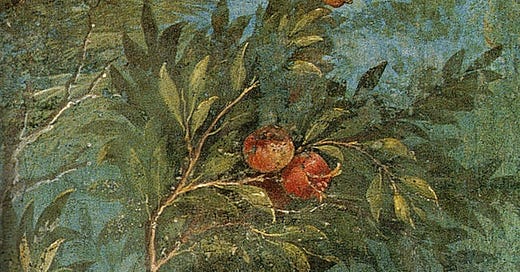This is the first spring to let me down. It’s usually my favorite season and my favorite time of the year, and I can usually depend on my mood to lift along with the temperature. Last week I was driving down my street and noticed that the trees lining the curb were starting to explode into tiny green buds, something I look forward to seeing every April as a sign that winter is folding back its wings. This year, I noticed the buds and thought to myself, “Oh, there they are.” And that was it. No other emotion: just numb all the way down.
Lately I’ve been trying to journal more consistently, but for someone who was a hardcore diary user as a child, I’m terrible at it as an adult. I tend to only write things down when I want to record a good memory, like a vacation or a birthday; or when I’m in the middle of an extended anxiety attack and I’m trying to process the gloop taking control of my head. So far in 2025, I’ve only journaled because of the gloop. I had one big depressive spiral in January (it lasted for three weeks) and recently had another one in mid-April (two weeks). Obviously, depressive spirals suck, but I hate mine especially because they come at me out of nowhere and I can never predict how long they’re going to stick around. Like some kind of fucked-up fever, they’ll run their miserable course and then I’ll suddenly wake up one day feeling fine. In the meantime, I’m forced to wade through side effects like heart palpitations, stomachaches, nausea, food aversion (a great way to sink back into my eating disordered habits—two for one there), and totally shot focus; I also get really, really tired, which is maybe actual fatigue or maybe just the desire to sleep more so I don’t have to deal with the thoughts that come when I’m awake. Feeling so much grief, I wrote in my journal on April 21st. Sick of my brain.
Something I’m really struggling with this year, within the gloop and outside of it, is finding joy—even finding contentment. The version of me that existed a year ago seems so distant. I know things were difficult then, too, in their own ways, but now when I look backwards I can only see the happiness, the hope, the flourishing creativity; and I miss it, and I keep pressing on those memories like a bruise. As one Tumblr post said, “this wound needs more salt,” or in the words of another, “ok but i need 2 open the wound More.” Nostalgia is a hell of a drug. I get so caught up in the past, remembering things and missing things and regretting things, that it just deepens my melancholy in the present, and sometimes I dig myself so deep into the melancholy that it stops being a hole and becomes a spiral instead, and then I’m back in the gloop1 again: salting the wound, circling the drain of things I can’t change, feeding into the pattern of sadness.
Something my two 2025 spirals have had in common is that they both started during periods of downtime. In January, it was a holiday vacation; in April, it was the first weekend after six weeks juggling my mom’s medical care with a hectic work schedule. A normal body might look at that kind of breathing room and think, “Hey! A chance to chill out and restore my energy;” my body usually identifies it as a great opportunity to find something new to worry about. Last year, I got a tattoo of a moth, a homage to Mary Oliver’s wonderful poem “The Moths,” which I love for the way it peered into my soul here:
And anyway
I was so full of energy.
I was always running around, looking
at this and that.
If I stopped
the pain
was unbearable.
I’ve written about heartache before, and that’s always what the pain feels like to me. On April 22nd, I wrote in my journal, I’m so afraid I’m going to feel like this forever, and the grief is never going to go away. I’ve been feeling so physically ill and I think it’s mostly anxiety-related. If I think about [redacted] too much, I get really hot and my chest feels tight and it’s like there’s a chip of ice in my heart. But I can’t stop pressing on the bruise. I go to sleep thinking about it; I wake up thinking about it; I sit down to try doing something else and my mind wanders back to it. It’s interesting because I don’t think I enjoy being miserable—I just seem especially predisposed to sink that way. I’ve been so bad at pulling myself out of the misery, in fact, that my therapist emailed me a PDF called “Pleasant Activities List” and instructed me to try out a couple of the Pleasant Activities before my next session.2 This was five days ago and I have yet to do a single Pleasant Activity.
I don’t have a hopeful or rousing conclusion to this post because I’m still crawling out of the gloop. I’m still pressing down on that bruise every day, and then I wonder why I’m not healing. I guess healing is a process, and it’s not linear, but knowing that doesn’t make it any easier to deal with as it’s happening. As another Tumblr post said, “they should invent an understanding and intellectualizing your feelings that makes them go away!!!”
In It Lasts Forever and Then It’s Over, Anne de Marcken wrote, “This sadness is not an empty church and not an empty house. It is the whole empty world and I am in it and it is in me.” Mostly, I am still feeling like that. But maybe, if anything, the hope looks like this photo I saved to my camera roll back in late December, just before the January spiral crept in—or, to phrase that differently, maybe this photo is all any of us can ever hope for.
To actually round out this post, I wanted to share my translation of Catullus’s c. 46 before spring passes and it’s no longer thematically appropriate. I haven’t translated much Latin since early January3 and this is an older translation of mine, but I really like this poem for how hopeful it is—quite a rare emotion from a poet who was probably depression spiraling for much of his life, too. F in the chat for you, Catullus.
Iam ver egelidos refert tepores,
iam caeli furor aequinoctialis
iucundis Zephyri silescit auris.
Linquantur Phrygii, Catulle, campi
Nicaeaeque ager uber aestuosae:
ad claras Asiae volemus urbes.
Iam mens praetrepidans avet vagari,
iam laeti studio pedes vigescunt.
O dulces comitum valete coetus,
longe quos simul a domo profectos
diversae variae viae reportant.Now spring restores unchilled warmth;
now the rage of the equinoctial sky
grows calm with Zephyr’s sweet breeze.4
Let’s leave the Phrygian plains behind, Catullus,
and the rich land of sweltering Nicaea—
let’s fly to the famous cities of Asia.5
Now my trembling heart longs to wander;
now my joyful feet gain strength from eagerness.
Farewell, dear group of companions:
having traveled far from home together,
different roads and different directions carry us back.6
I hope this season has been kind to all of you.
I never thought I would share excerpts from my journal for internetwide consumption, and I don’t expect to do it again. Enjoy?
It’s occurred to me, as I write this, that my depression metaphor is sounding a lot like the Molasses Swamp from Candyland, a game I have not thought about for at least fifteen years. The internet informs me that landing on the swamp’s peril square means you need to stay there until you draw a red card. To continue the metaphor: I guess I’m waiting for my red card.
I think it is an old list. One of the options is “Surf the Internet.”
Because of—all together now!—the gloop.
Referring to Zephyrus, the god of the west wind, associated with light and gentle breezes.
Lots of geography to unpack here. Phyrgia was a region in the Roman province of Bithynia, part of modern-day Turkey; Nicaea was another city in Bithynia, known to become extremely hot during the summer months. Catullus served on the staff of Bithynia’s governor from 57-56 BCE, and this poem is an ode to his year of service being up: he’s preparing to return to Italy. What he refers to as “Asia” really just would have been more of modern-day Turkey—our current archaeological sites at Pergamon, Ephesus, and others would have been tourist destinations for him.
Referring to the friends who had served with him at the same time, also preparing to head home. The emphasis on leisurely, touristy travel is deliberate: only the rich, Catullus among them, could have afforded to do it.





Every time I read your blog posts I'm struck with such a sense of familiarity and solidarity. Asuch as I wish you were feeling better, it's somewhat encouraging to know I'm not alone. Thank you for sharing your thoughts, as usual.
this translation is so lovely!! i’m having a rough spring myself, but i admire your eloquence to put your feelings to words and make something beautiful and relatable from it. hugs 🫂